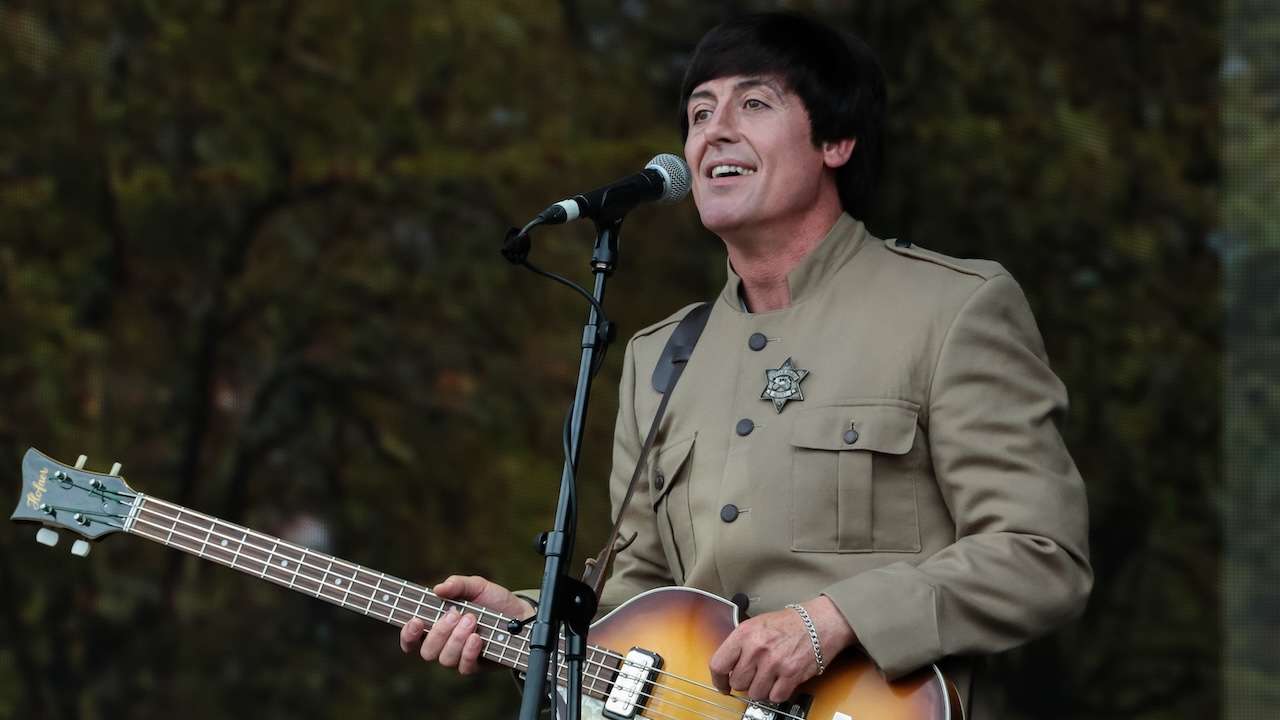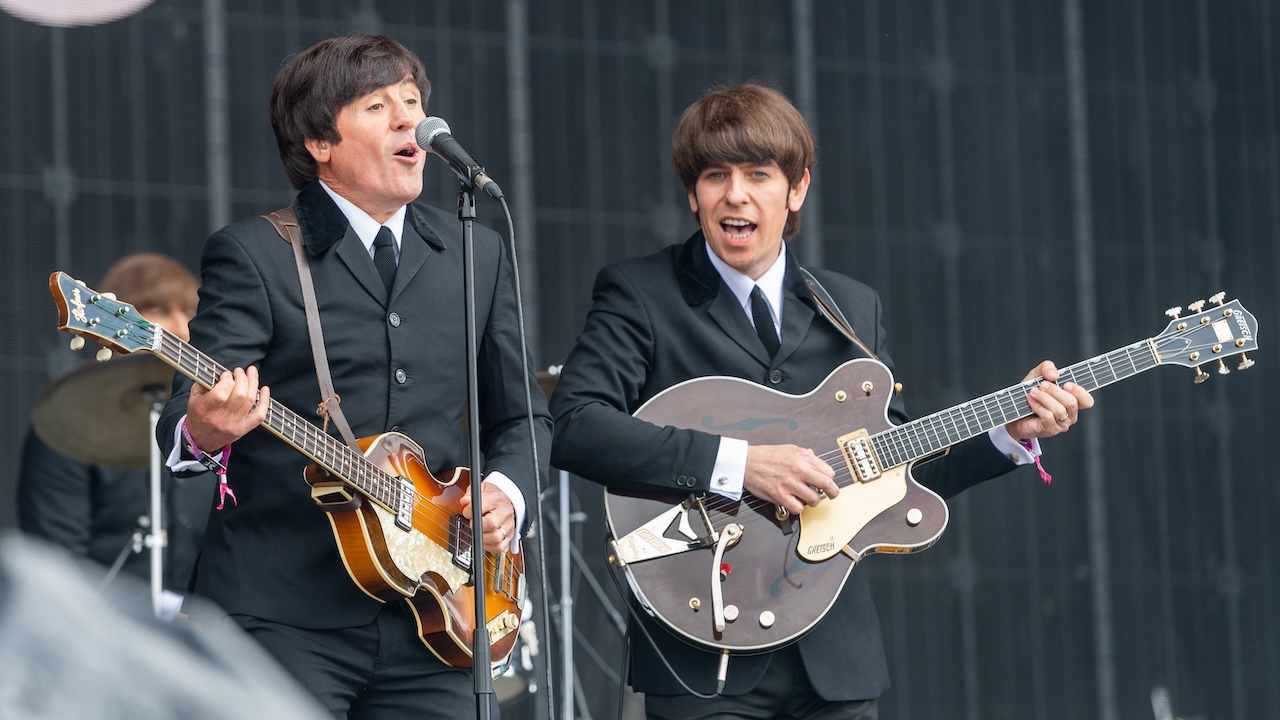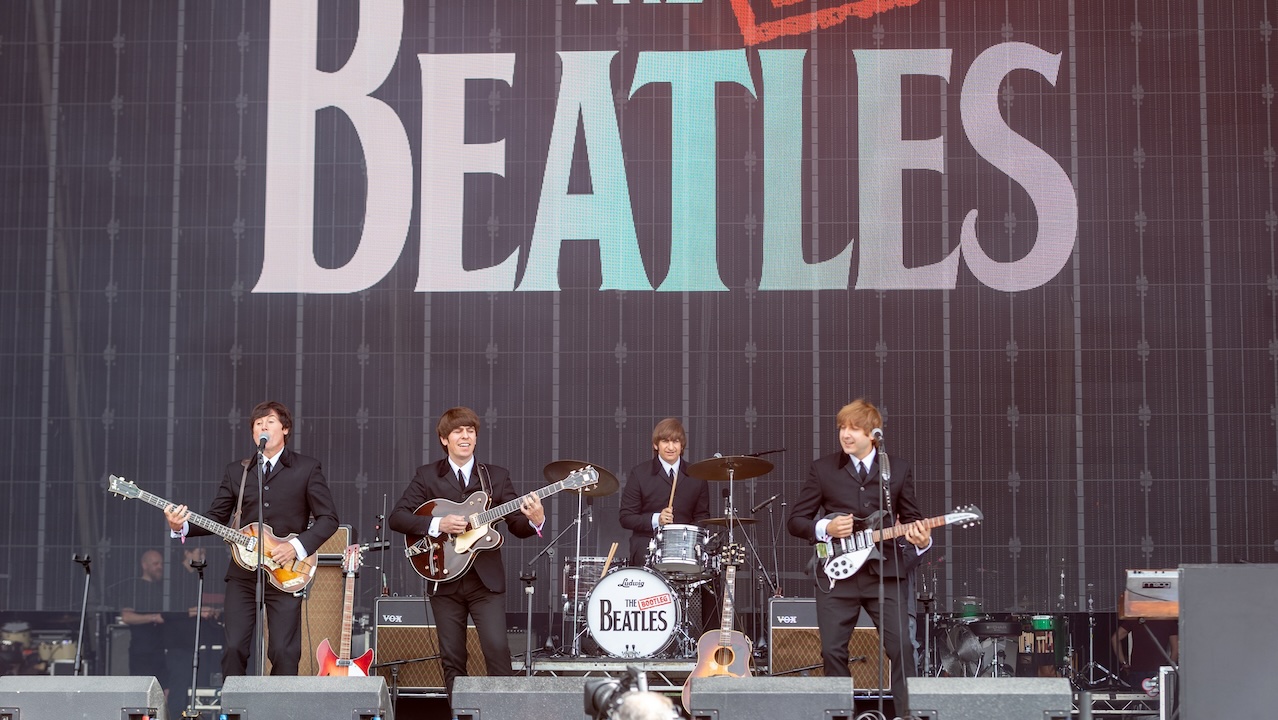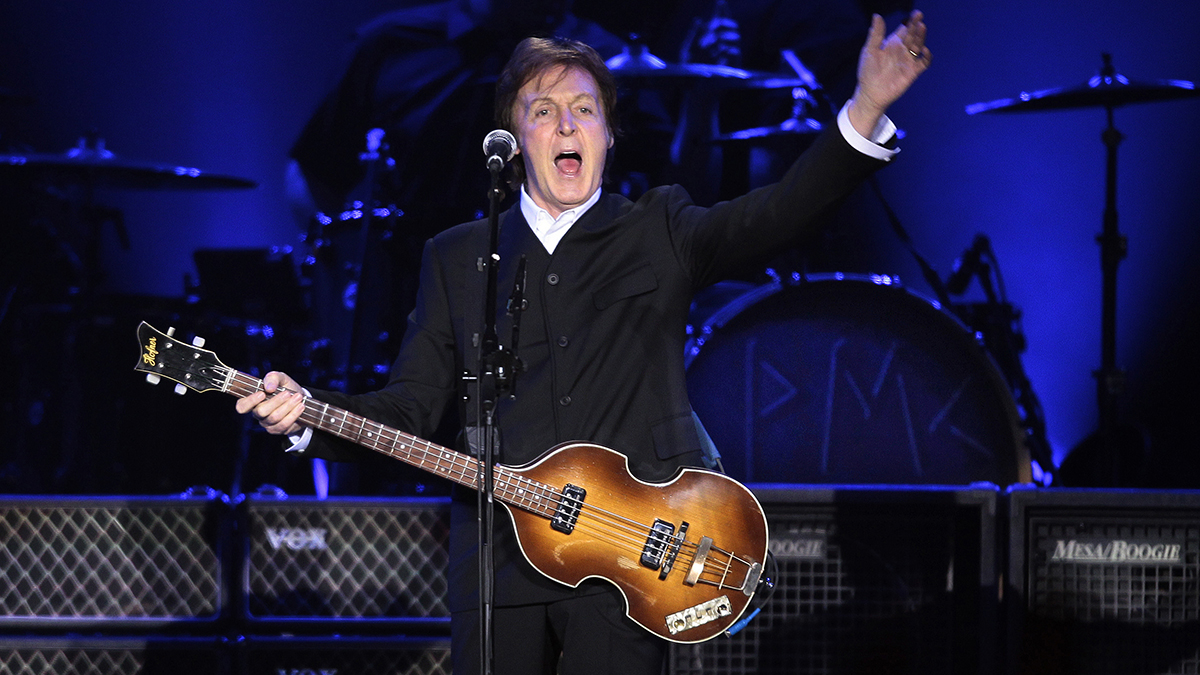“I bought a right-handed Hofner, re-strung it and learned to play like a lefty, which was a nightmare”: How The Bootleg Beatles’ Steve White became a carbon-copy Paul McCartney
Think you can play a bit like Sir Paul? It’s not as easy as you think, says Bootleg Beatles bassist Steve White

The world’s most successful tribute band – okay, with the possible exception of Björn Again and The Australian Pink Floyd – is the Bootleg Beatles whose near-perfect sound when it comes to emulating the Fab Four will blow your mind.
Bassist Steve White, whose job it is to sing, play, talk, look and even dance like Paul McCartney, has put years of commitment into his job, not least while learning to play bass guitar left-handed.
White, from Nottinghamshire in England, has been playing the McCartney role in Beatles tribute bands since 2006, supporting veteran bands from the original era such as the Animals, Herman’s Hermits, Marmalade and more.
The line-up of the Bootleg Beatles has fluctuated, but currently consists of White plus Tyson Kelly (John Lennon), Stephen Hill (George Harrison) and Gordon Elsmore (Ringo Starr).
The group’s founder and former Lennon is Neil Harrison, who now manages the group and who recruited White a decade ago. One of Harrison’s better-known anecdotes comes from the time when the fake Beatles met two of the real ones, McCartney and Harrison, both of whom were apparently on friendly form.
When McCartney and the Bootleg Beatles were playing at the Queen’s Golden Jubilee at Buckingham Palace in 2002, the real Macca sent them a note asking them to refrain from playing Hey Jude – as he was planning to play it himself. A second note from Macca promised that he was planning to heckle them from the crowd, although the knight of the realm was apparently joking.
The Bootleg Beatles emerged last year with news of a 50th Anniversary celebration of The Beatles 1967-1970 compilation album, also known as the Blue Album. As Steve White told Bass Player, “I played this album again and again. I was fascinated by how much the music changed throughout the greatest hits.”
All the latest guitar news, interviews, lessons, reviews, deals and more, direct to your inbox!
The following interview from the Bass Player archives took place in May 2022.
You’ve been in the Bootleg Beatles as long as the actual Beatles were a band.
“Yes, it’s hard to believe the body of work that they created was all over and done with before they were 30. I mean, it’s nuts when you think about it – not only were they producing some of the most incredible elements as far as creativity goes, but there was the outpouring of writing songs for themselves and the Rolling Stones and Billy J. Kramer and other people.”
When did you first hear the Beatles?
“I’ve been a big fan since the age of nine. I found this Beatles greatest hits LP at home. When you pulled out the sleeve that contained the record, it had a collage of pictures of the Beatles in all their different incarnations – you know, starting with the collar suits and the moptops all the way through to the moustaches and Sgt. Pepper. I acquired all the back catalogue and just listened to it endlessly.”
When did you start playing?
“I didn’t start until quite late, maybe when I was 20. I ended up in a Sixties covers band as a rhythm guitar player. I remember we wanted a look for the stage show, and it was about the time that the Beatles Anthology came out in 1995, so we thought we’d like to adopt the look of the Beatles because it’s an iconic Sixties image, with the Vox amps and all that, even though we were still doing Pretty Woman and all these other songs.”

“We were never going to be a Beatles tribute, even though we called ourselves Birthday, which is a Beatles song. We just thought it was a great name that nobody would forget, and also our opening song happened to be Birthday by the Beatles. I think we probably did She Loves You as well. We did a mix of all sorts.”
How did the band become a Beatles tribute?
“Somebody came to one of our shows and said, ‘We love what you do. Can you come and play our birthday party as the Beatles, and do a whole Beatles show?’ So we went away and learned a load of Beatles stuff and played the party.
“Then somebody came along to the party and said, ‘Oh my God, that was great, can you do the same thing for our wedding anniversary?’ and inadvertently, the band started to metamorphose into a Beatles tribute band. It became more and more about the Beatles, until we were doing it full-time.”
Who were you playing in that band?
“John Lennon. I switched to playing Paul McCartney because people kept coming up to me and telling me that I looked more like Paul than I do like John. After this happened on a number of occasions, me and the then-bass player decided to swap over. He learned all the rhythm guitar stuff and I learned all the bass. It felt quite natural for me to be Paul. He was always my favourite.”
Had you played much bass before?
“No, never. I bought a right-handed Hofner violin bass, restrung it left-handed and started trying to learn how to play it as a lefty, which was a nightmare. Even the most simple line was an effort. I couldn’t hit the right string, let alone play and sing at the same time, so I thought ‘Right – let’s start from the beginning.’
“I started with Love Me Do, which has a very simple bassline, and when I’d kind of got that one down, I went to From Me To You and tried to progress. I spent three months just slogging away at it, and I was playing bass eight hours a day.”
Do you remember your first show as Paul McCartney?
“I remember the first time I tried to play a whole set left-handed. We had a show entertaining the staff at a holiday park, and all day I practised the bass parts. Just before we went on stage, they said ‘Do you want the right-handed or the left-handed bass?’ because I had both with me.
“I wasn’t sure I was ready to do it yet, but I took the lefty, went on stage and started to play – and oh my God, in the first minute my hands felt like they’d turned into feet. I couldn’t do anything. I literally clawed my way through the set, and it was horrible, absolutely horrible.
“To force myself to do it, I bought myself a left-handed Rickenbacker 4003 for about 1800 quid, and that was it. I just thought, ‘I can’t not do it, now I’ve spent the money’. I can make it look very natural now. You would never assume that I’m not a left-hander when I’m playing on stage.”
Have you built up strength in your left hand?
“I couldn’t do anything at speed to start with, but some dexterity does come with repetition. I learned to play Yesterday and Blackbird on guitar left-handed, too. That is maybe a little bit more clunky than bass, but I’ve seen a lot of Beatles tribute bands and more often than not, the guy playing McCartney switches back to a right-handed guitar for Yesterday. But I don’t like to break the illusion.”
How much work do you put into sounding like McCartney when you sing?
“Personally, I don’t think I sound like McCartney. Our manager Neil will say I sound quite a lot like him, but to me, he and I have different timbres to our voices. I have the same vocal range as him, though, so I can hit anything he does. I can do all the screaming stuff, you know, and then follow it with a ballad.”
What about moving on stage the way he does?
“I’ve spent a lot of time in front of various computer screens, watching footage of him throughout his career, and really noticing little changes in his body language, because obviously that has evolved from when he was 20 to what it is now. In the early days, the head was going, the body was going, and he’d shift from leg to leg. I’ve studied a lot of things to try and pick those bits out.”
How important is it to have the right bass gear?
“Absolutely huge, because without the gear, you can’t get the sound. There are songs that have to be played on the violin bass, because of that woody, clunky sound and the flatwound strings.
“I’m playing through a Vox cab, too, although the head isn’t a Vox amp. Those old Vox heads have a great sound, but they don’t travel very well. Mine was forever petering out, and obviously the bass is fed directly to the PA, but you lose any monitoring on stage. So what I’ve had to do is swap the insides out for an Ashdown, which is inside the Vox head case. It’s much more reliable that way.”

To be in a band like this, do you need to be an actor as much as a musician?
“I think if you want to be believable, yes. Don’t get me wrong, anybody could chuck on a black suit and go out there for fun, and play in a pub or a club, just for the love of it. You don’t have to go to any serious lengths to do this. But for me, I never liked that. I always loved the Beatles. I adored them and I didn’t want to do them any injustice.
“Even before I was with this band, I was just obsessed with McCartney. I thought he was so good. His bass playing was amazing. His vocals were just ridiculously good. He’s just phenomenal, so I wanted to get on stage and I wanted to be believable. I didn’t want people to go, ‘You’re supposed to be the Paul character.’ I wanted people to go, ‘Oh, God, he is Paul.’ I wanted to do him credit.
“You know, I don’t look exactly like him. I don’t think I sound exactly like him. But my thing has always been the big picture. If you’ve got enough of the jigsaw pieces, it makes the character. You might not have them all, but if you’ve got enough of them, you can make people believe.”
Joel McIver was the Editor of Bass Player magazine from 2018 to 2022, having spent six years before that editing Bass Guitar magazine. A journalist with 25 years' experience in the music field, he's also the author of 35 books, a couple of bestsellers among them. He regularly appears on podcasts, radio and TV.

